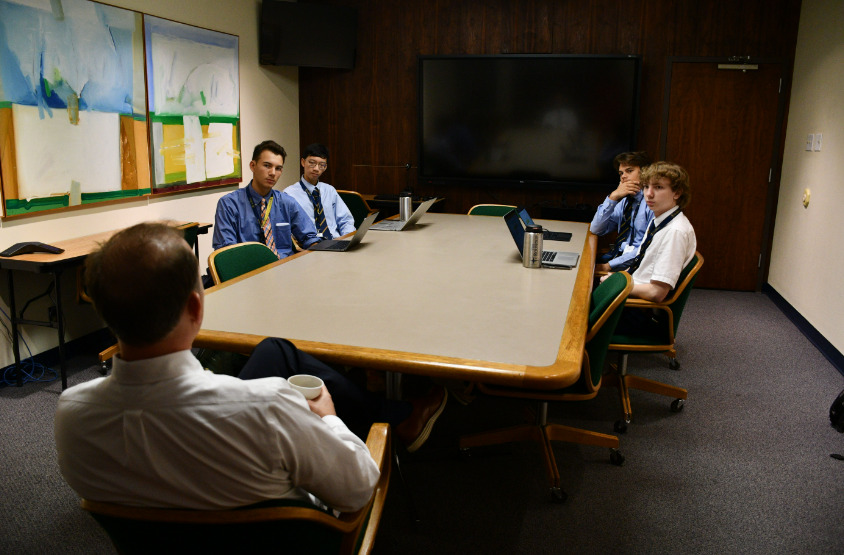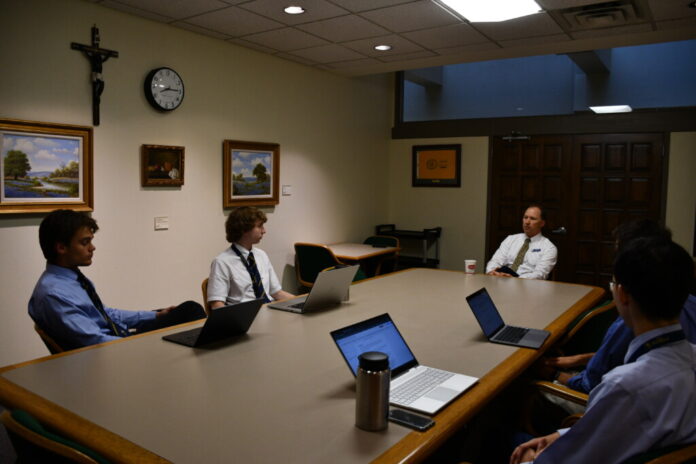The best tool we can give you is discernment because we’re not going to be able to stay ahead and predict what it will do tomorrow. There won’t be an adult sitting beside you while you’re at the keyboard a lot of the time. – Principal Tom Garrison ’92
As a former Jesuit student himself, Mr. Garrison combines his unique perspective and experience with his exemplary leadership qualities to guide our student body and administration. With this in mind, The Roundup attempts to connect our Principal to the student body each year with a series of questions we believe pertain to important student matters.
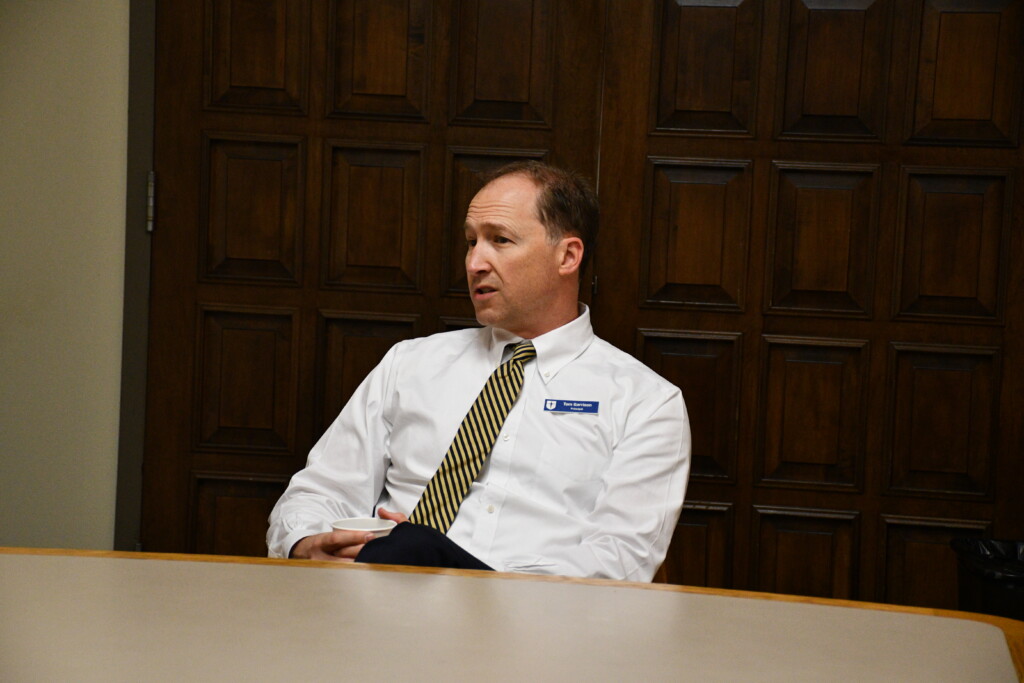
Logan Thompson – What are your thoughts on the current education savings bill in the Texas senate, a bill which would award Texas families vouchers to pay for private school families, and how could this affect private schools like Jesuit?
It depends on a lot of things. It depends on how the bill is written. One of the things I am unclear on is whether or not we would even know people are using voucher money to pay tuition. My assumption is that we would, and my understanding is that we would have some say in whether or not we would accept it, and we would have to make the decision about whether or not we would accept it.
Now, If the money goes directly to the families, we may not know they’re using voucher money. I don’t know exactly what they have in mind for this. So, I think if the money goes from some outside entity directly to the school, then obviously the school knows. But if the money goes to you, the parent, and then you pay us, we don’t know.
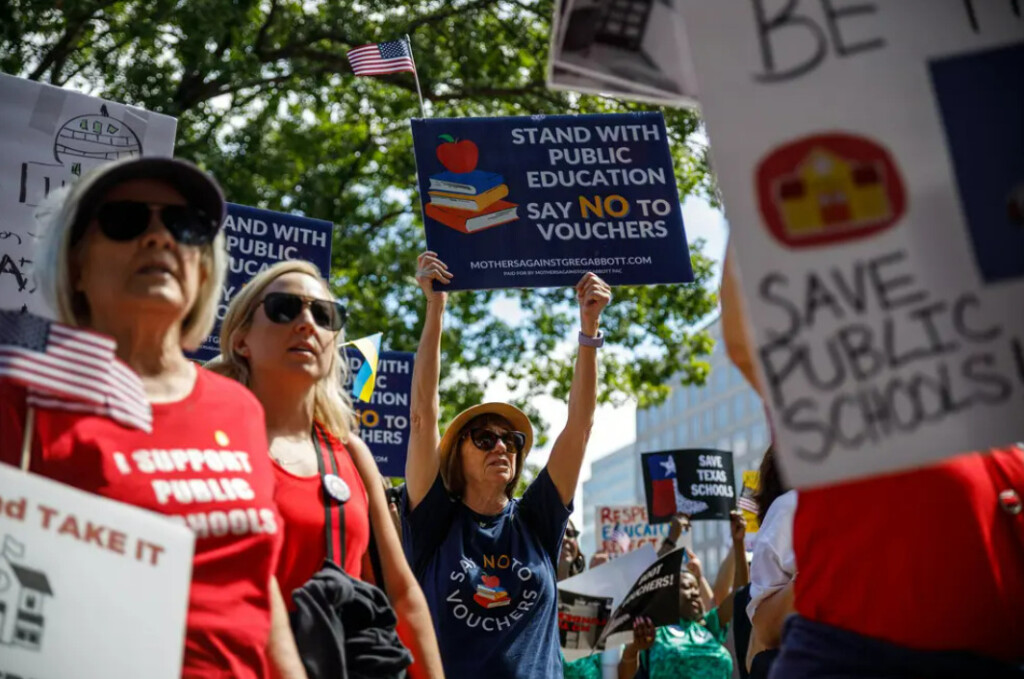
There are some that think that this will help schools with low enrollment because people will be more inclined to pay tuition if they get their money from somewhere else.
Right now we are fully enrolled. We have a strong group of students here. A strong applicant pool. My assumption is it would mean more applicants, which would mean more competition, which is good for private schools.
I think people trying to pass these bills say it’s good for private schools. I’m not sure I see that. I don’t think we need to get better at their expense. I actually, just so you know, I’m scheduled Tuesday morning for a conference call on this exact topic with someone who represents private schools. And they’re kind of explaining to us how they think the bill might be passed.
Anthony Nguyen – Recently, Mr. Ellis had an article published on America Magazine. His article was titled “Dear Catholic High Schools: Don’t Make Theology an Afterthought.” Simultaneously, religious devotion in the US is dwindling. As a Jesuit community, how can we foster intellectual competence and spiritual growth in the face of mounting secularism?
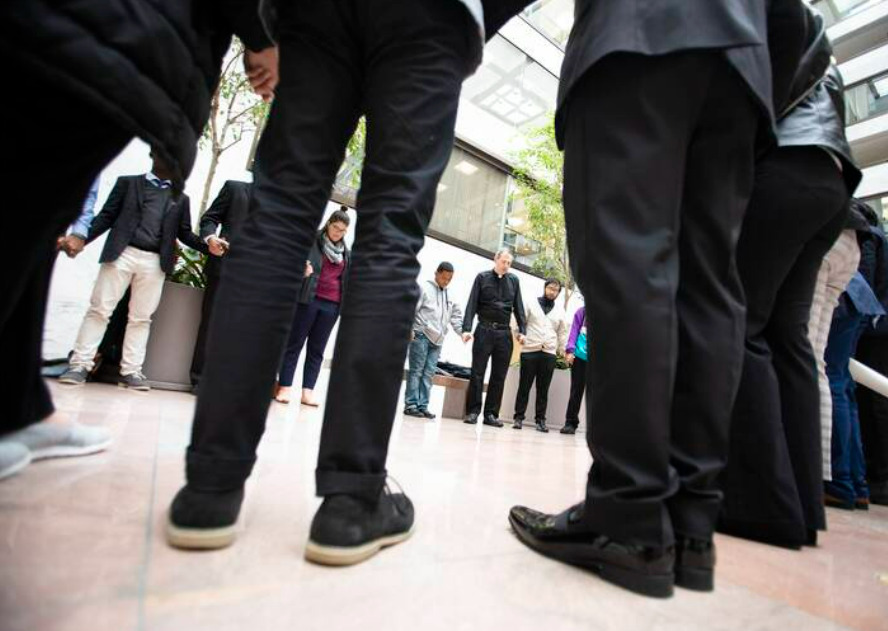
Well I think that things that students are doing with faculty right now are kind of the key to success here. Campus ministry engages, those four grade level groups; godly guys, religious rangers, faithful fellows, and then the fourth one.
What you have is you have a group of guys at each grade level, you’ve got a couple faculty members at each grade level and the idea with that is you get a little more outreach. What I would like to see is that continue to grow. This is because I think my hunch is people are weary of big institutions right now.
The bishop also talked to us about the Synod when he was here a couple weeks ago. The church is trying to understand and listen to what it is that your generation needs and I’m really hopeful for what they learn from that because you guys are the church. Some people say you’re the future of the church, but really you are the church. If y’all are not feeling it or engaged in it, then the church suffers, right? So, I’m very hopeful for the Synod and what happens from that.
I’m very happy that you’re engaged here, but I think you need to engage the parishes as well, and that’s another layer. This is because parishes behave differently than schools, and they have to. But I was very hopeful when I saw how our seniors were at community days around some things like reconciliation. I thought it was a really wonderful reconciliation service type of opportunity for students and was well received.
Peyton Bristow – Last year we saw a never before seen rise in artificial intelligence and each department has put out their own policies, but they’ve been mostly in regards to academic integrity. How can Jesuit foster a positive use of artificial intelligence?
I think the best thing we can do is be open to learning from you guys. We certainly need to be learning as adults also. But, it seems that something like this is changing very rapidly. And I know of students who just have their hands on this and are using it and experimenting with it.
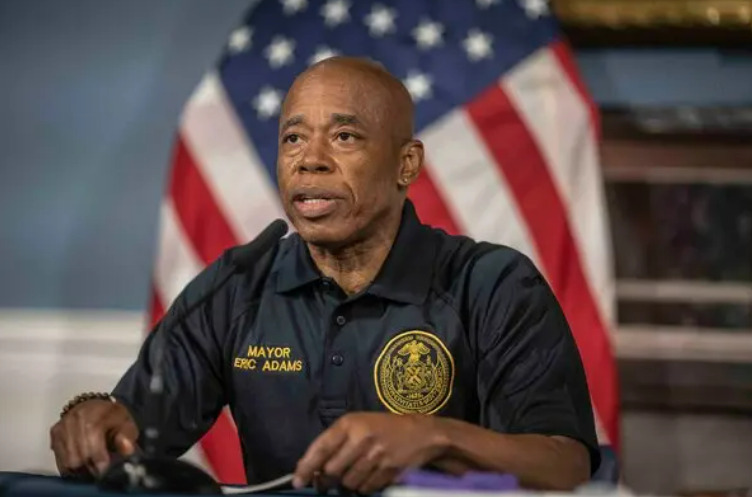
The the best tool we can give you is discernment because we’re not going to be able to stay ahead and predict what it will do tomorrow. There won’t be an adult sitting beside you while you’re at the keyboard a lot of the time. So, making sure you have a strong reflex for making good decisions and good choices. Then the other thing, I think that we do need to move beyond just the idea of looking out for misuses of it because you can misuse anything. We need to be thinking about the positive uses and what can that look like.
Ben Woodard – Earlier this semester, Father Green, head of the Jesuit Province, reaffirmed Jesuit Dallas as a school who fulfills the values and standards of a Jesuit school. What does this moment mean to you?
You guys know I’ve been here a while, right? And I was a student here. And when I was a student here, there were considerably more Jesuits. To be truthful, I didn’t think about what that meant a whole lot. But there was no question that it was a Jesuit school. We had a Jesuit principal, we had a Jesuit president. I had several teachers who were Jesuits. Today Jesuit schools have fewer Jesuits than they did before and the province has a responsibility to figure out where to put those guys and make the best decision with resources and personnel to serve the best interest.
Really I don’t want us to be Jesuit in name only. There are schools that have names that sound like they’re affiliated with a religious order, but are not, or are only loosely. We need to be strongly affiliated with our Catholic roots and foundations, and not just Catholic, but to the Jesuit charism. So, to me, the sponsorship renewal process validates the path we are on as a Jesuit school.
Peyton Bristow: Our theme for the year has been open to growth. Now in what ways have you seen the Jesuit body embody that? And then in what ways can we continue to improve and be open to growth?
One of the things I’ve continued to see since we’ve come out of the pandemic is the blending of classes. And what I mean by that is, I don’t perceive of this horrible class structure where seniors pick on freshmen, or juniors pick on sophomores. You guys seem to all coexist in positive ways. I think that’s being open to just everyone around you. We’re not trying to put labels on each other. I think it’s one of the secrets to how this place functions so well.
I was part of a tour for a prospective family on Monday and the mom asked me where each grade level was. She’s like are we in the freshman wing now or is this a sophomore wing? I was like, no, we really don’t separate the guys by grade level and she was kind of surprised. That’s one little example.
Then things like the school spirit you guys have brought to football games have been really cool. The home games have been amazing and that’s just like a very visible and tangible thing. Also the amount of clubs that happen right now is insane. If you look at the the activity calendar, you guys are doing things like this with your extracurricular time. Extracurricular time is just that, it’s not mandatory, but it’s something you guys take advantage of.
Ben Woodard – With Ranger Day coming up next week, what are you most excited about and what do you hope new students will take from the experience?
I want guys to walk away with a memory, a feeling of being connected to this place and that’s what I want them to remember 30 years from now. The feeling of being a part of something.
I’ll have an 8th grade visit later today, and I tell them, if you want to come to school, school is a little easier, right? Even if the work is hard, the motivation is there if you want to be. And I want Ranger Day to be one of those moments that you just look back on and go, yeah, that was cool.
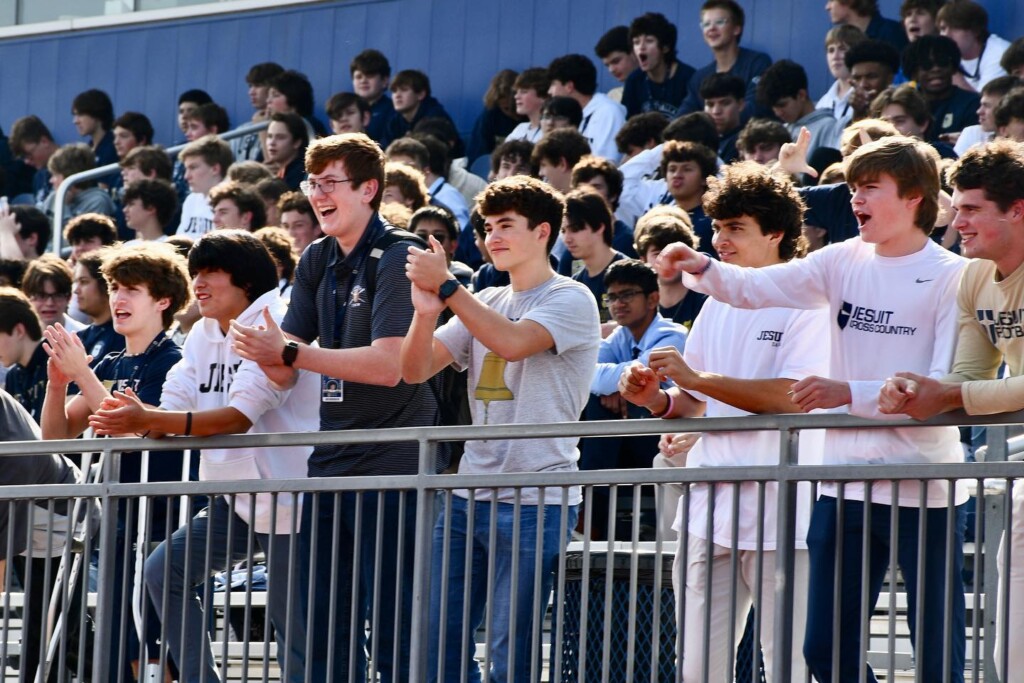
When your with college buddies and you’re talking about it, they go, that’s weird. My school didn’t do that. I wish my school did that. Why didn’t my school do that?
We can do that because, like community time, you guys take advantage of it. Can you imagine how crazy that idea is? 1100 guys with freedom to kind of dress weird and goof around and things don’t get broken, nobody gets hurt, you’re having fun. That is really cool. That is a really special thing. So that’s what I wanted.
Logan Thompson: If you were to give advice to a current freshman halfway through the first semester, what would it be?
Take a risk, take chances. I think lots of freshmen have barriers up because they’re worried about being embarrassed or being accepted. I think that’s just the natural human fear or tendency. But by and large this place is pretty forgiving. If you want to get up at open mic day and sing and you’re terrible, people aren’t going to call you the terrible singer for the rest of your life. And if they do, they’ll do it lovingly, not to tear you down. So I think the thing is take a risk. Go out of your comfort zone. See what’s on the other side of fear. And it’s usually something pretty good.
Anthony Nguyen – Recent conflicts and disasters have erupted in the last few years. We have the Russian Ukrainian War, the Israel Hamas War, and numerous earthquakes in the Middle East. So how as a Jesuit institution, are we centered on trying to engage students in being agents of change and being generous towards the people who are affected by these tragedies.
Well, I’ll share something personal on this. This weekend when the attacks on Israel happened, I was watching the news and I realized that there were things I didn’t even know about the region, about the history. And the more I thought about it, I thought, gosh, that’s really unfortunate to not know. Because what I found myself doing was forming opinions about it, but the opinions were uninformed. I think we all have opinions. Why wouldn’t we? We should have opinions. And I think we should have emotions too.

There is a duty or a responsibility to become informed so I’m reading a book right now about Israel and the history of Israel. That’s just for me personally, so that I can have informed conversations about it or at least let the energy that comes from the emotions go to a place that is helpful and useful.
So I think our responsibility as a Jesuit institution is to inform ourselves. An interesting conversation we’ve had in the admin team a few times is kind of what else can we do outside of curriculum on this? You just named three big hot topics. We can probably come up with a few more pretty quickly.
Where do you start? Which one do we talk about? Israel Or do we talk about Ukraine? Or do we talk about natural disasters? And we can’t have an assembly every day for the whole school. Look at our curriculum are we addressing these things? And if the answer’s no, we need to fix that.
Recently, somebody said to me something once about y’all’s understanding of September 11th. You guys were not alive for that. So, how do we look back at history and decide what are the things relevant to talk to you about? When I was your age, the big deal in social studies was to get to the Vietnam War. Which was in the late 60’s, early 70’s, and it extended beyond before and after that.
But if you think that in 1992 the goal was to get to the late 60’s and early 70’s in social studies class, what else was going on after that, you know? And, a lot has happened in the 30 years since then, since I was a student. So I think the responsibility is to educate ourselves as much as possible.
Special thanks to Peter Loh ’24 and Griffin Taber ’24 for helping create interview questions.
The Jesuit Roundup staff would like to thank Mr. Garrison for creating time for us in his busy schedule and we hope our questions properly represent the. Please tune into the Jesuit Roundup for more news pertaining to student life.
